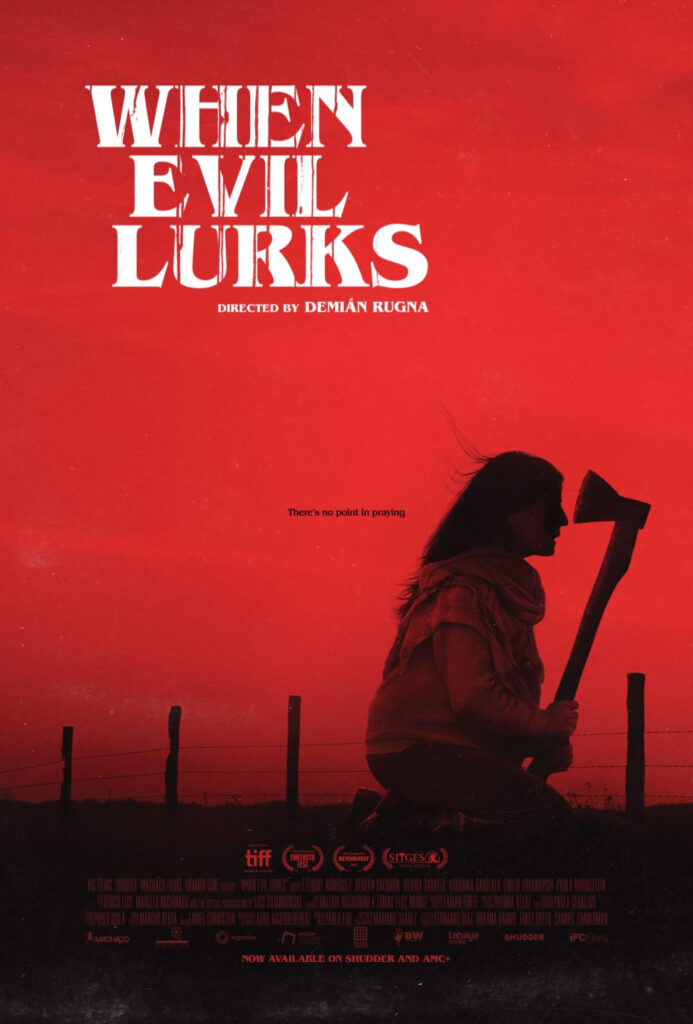From writer/director Demián Rugna comes When Evil Lurks, a kind of dystopian tale, wherein the suffocating threat to humanity is not its own devices, but rather demonic possession.
One night, brothers Pedro and Jimi (Ezequiel Rodríguez and Demián Salomón), hear gunshots in the woods near the family farm in rural Argentina. When they investigate the next morning, they find the mutilated remains of a ‘cleaner,’ a person employed by the government to carry out occult executions of ‘rottens,’ or individuals possessed by demons.
Rottens are an ever-present problem in this film’s universe. Apparently, the charlatanism of organized religion was finally too much for the lord, and churches lost their power to battle evil. Now possession is something of an infectious disease that can spread through a community. The cleaner that Pedro and Jimi found in the woods was on the way to kill a rotten in a neighboring farm.
A rotten in the community is a very bad thing, as it will do all it can to corrupt those who come in even peripheral physical contact. For example, the clothes one wears on one’s back must be disposed of after being in the presence of a rotten, or the evil could jump to another person if still worn. That’s an example of the esoterica behind the movie, and it’s something Rugna requires an audience to follow, even when the rules are contradictory or confusing.
Pedro, Jimi, and another neighbor, Ruiz (Luis Ziembrowski), find out who the local rotten is, and haul him away in a pickup in an attempt to remove the evil from the community. This is the only course of action, they believe, because of those esoteric rules. Only a cleaner has the knowledge to kill a rotten without the death resulting in much worse. Of course, the trio screws it up, and possession spreads through the community like Covid.
The first to go are Ruiz and his wife, in graphic and bloody fashion. This scene is where Rugna lets the audience know just what they are in for, and just what happens when one breaks the rules.
Afterwards, the film’s focus is Pedro, who wants nothing more than to get his family to safety. Besides his brother, there is his mother and his two sons (Marcelo Michinaux and Emilio Vodanovich), who live with their mother in town. No matter what Pedro  does or how swiftly he moves, the evil catches up. The middle act is a gruesome showcase of death as Pedro frantically gathers up his family, amidst townsfolk and authorities who fail to see anything is amiss.
does or how swiftly he moves, the evil catches up. The middle act is a gruesome showcase of death as Pedro frantically gathers up his family, amidst townsfolk and authorities who fail to see anything is amiss.
In the final act, all the running is over, as Pedro sees there is no point, and he, with the help of super-expository character Mirta (Silvina Sabater), confront the rotten in a schoolhouse. How it goes, I’ll leave to a viewer to find out.
When Evil Lurks might be a tough watch for many people. The gore, and who it is inflicted upon, is heavy. I don’t think toning it down would have helped the film much in that regard, but there will be viewers who are turned off by it. I understand. Even this horror veteran gets his stomach turned on occasion.
It’s not wall-to-wall gore, either. The violence is just an aspect of a film whose main technique is a frenetic pace. Pedro is always on the verge of panic, so much so that it makes sense that very few people listen to what he is saying. He is so close to being a raging madman that even late in the film, Rugna could have made the story about all of this being in Pedro’s head. Alas, he did not. There is a demon loose in Pedro’s community, and it is cutting a swath through everyone he knows.
Rodriguez is the star of the show. He has the most screen time, and uses it. His delivery is larger than life. Meanwhile, Salomón is understated and contemplative. He’s the counterweight to Rodriguez, ever-reliable. He keeps his head down and plows through his role.
Rugna put a lot of stock in the rules he created for the demons, and it is an interesting bit of world building. It leaves open the question of what urban society is like, hinting that things are not going so well since rottens began appearing. The world building is interesting, but also a little much for the story. The level of background info heaped upon the viewer can be burdensome, as we try to relate it to what is happening in the plot. The film works much better when one can forget all the background and focus on what is actually happening on the screen.
